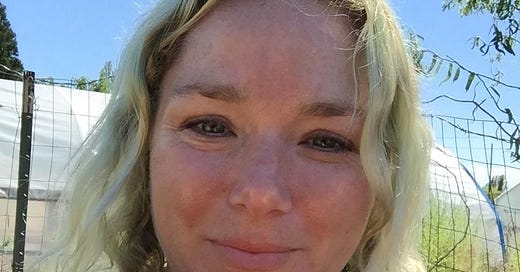First off, tell us a little about yourself. How do you see yourself as a writer?
I’m a general space cadet. When I wander into random bars in Albuquerque or Vegas for some day drinking, men always tell me I seem like a “dreamer.” Probably, it’s the ADHD. I live in my own little world.
I’m a musician with two albums of original music out with my band Pimento in the Hole. I help run a small, diversified farm in Eastern Washington State. I’m a single mom. And I have six books published, and three more under contract to come out, hopefully this winter. I write in a lot of genres, because I read and enjoy a lot of genres—everything from regency romance to YA fantasy to Carl Hiaasen-esque mysteries. The only common threads in all my books are my penchant for including a surreal dreamworld reminiscent of Carlos Castaneda, and for including neurodivergent characters.
Oh, I love Carlos Castaneda! Already we’re hitting on the intersection of dreaming, spirituality, drugs, and mental health. How would you say these elements come together in dreampunk fiction? What does the genre mean to you personally?
I had never heard the term “dreampunk” until I met you, but I’ve apparently been writing it a long time. The genre means a lot to me. Alternate reality—whether in the form of fiction, fact, or speculation—is an important part of my reality. I feel like I live in an alternate universe a lot of the time as a neurodivergent person. The things I take for granted as real aren’t always part of the common, cultural reality of those around me. Thus, dreampunk feels affirming to me as a person, and it’s a good place for my imagination to make its home.
What fiction would you point to as your biggest influences for the type of stories you write? Any favorite authors you’d like to mention?
I have read so much, and I know a lot of authors have rubbed off on me. I think the ones who have, erm, rubbed off hardest are probably Lynda Barry, Terry Pratchett, and maybe Hunter S. Thompson.
What would you say qualifies as a “dream” in the context of dreampunk? Do you have to be asleep? Could it be artificially constructed like a simulation?
I think so many things can be qualified as a “dream” in dreampunk. To me, it really just means alternate reality. In most of my work, people are actually asleep, or in a sort of trance, when they enter this alternate reality. But that reality is every bit as real as their waking life. Other times, drugs are involved. But I believe that simulations could count, especially if those simulations feed into “real life” in bizarre, mysterious, and speculative ways.
How about other media like TV, music, etc.? Give us an idea of your aesthetic.
I feel like I have to caveat this with the admission that, while people call my work dark a lot, I don’t tend to consume dark media of any kind, unless it’s music. I have a lot of trauma, and I tend to work through that in my writing. The stories I consume other than my own, however, are my escape from that.
Because of my neurodivergence, I go through long periods when I can’t deal with watching TV or even listening to music: it’s too loud, takes too much attention. Lately, however, I’ve been really into movies and TV shows. The MCU (Avengers) movies, and lately the Netflix series Lucifer. Both hit my action/adventure, humor, and emotional depth nerves. Also, Russian Doll on Netflix is amazing.
Music, I love almost everything, but lately I listen to Beirut, The Strokes, Bali Bandits, and Seth Hills a lot.
Oh yes, Russian Doll is fantastic. And fairly dreampunk, I’d say. How would you describe your dreams in general? Can you remember them? Do you ever realize you’re dreaming and take control?
I have lucid dreams a lot and have had them since I was a literal baby.
Lately, though, whenever I go lucid the dream starts to fade and I have to grab hold of it; I think I have emotional crap to work through or something.
Grab hold of it? How do you do that?
I grab hold of dreams by… I guess by letting go of my ego? Mostly, the dreams fading out seems like an anxiety thing for me. I have to let go of myself, and let the dreamworld re-form around me. The dreamworld… Purgatory… seems like it’s formed by forces outside my mind.
And you can remember them pretty often? Have you ever pulled anything specific from a dream to include in your writing?
I have trouble remembering my normal dreams and I keep a dream journal. But I wake up screaming a lot so maybe it’s good I don’t remember much. But yeah, I pull a lot from my actual dreams to use in the dreamworld of Tales from Purgatory and in the dreams of my characters in my other books.
Very cool. The writing part, not the screaming. How do you hope to shape the dreampunk genre with your writing?
It would be cool to bring neurodivergence into the genre more in a positive way.
How can we support you in your work? What should we buy, and where can we find it?
I would love people to check out my books! I’m available on Amazon and B&N. The Other Place series has many dreampunk elements, and my Tales From Purgatory series—which should come out soon—is entirely dreampunk. If people follow me on Twitter, @LidsRodney, I will talk about it a lot.
Update: Elizabeth contributed to the dreampunk short story collections Mirrormaze (2020) and Somniscope (2023)!



